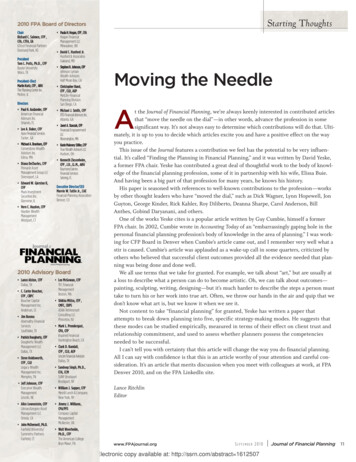
Transcription
Personal FinancialPlanning(Wealth Management)S. MuraliK.R. SubbakrishnaFCMA, ACS, CAIIB, LL.B., MFM, M.Com.,Adjunct Professor, ICFAI Business School,Director, Enhance Your Competence andFormerly Assistant Vice President, Kotak Bank,Bengaluru.M.A., CAIIB, LL.B., B.Sc.,Adjunct Professor, ICFAI Business School (Retired),Director, Enhance Your Competence andFormerly Associate Vice President, Kotak Bank,Bengaluru.ISO 9001:2008 CERTIFIED
AuthorsNo part of this publication may be reproduced, stored in a retrieval system, or transmitted in any form or by anymeans, electronic, mechanical, photocopying, recording and/or otherwise without the prior written permission of theauthors and the publisher.First Edition : 2018Published by: Mrs. Meena Pandey for Himalaya Publishing House Pvt. Ltd.,“Ramdoot”, Dr. Bhalerao Marg, Girgaon, Mumbai - 400 004.Phone: 022-23860170, 23863863; Fax: 022-23877178E-mail: himpub@vsnl.com; Website: www.himpub.comBranch Offices:New Delhi: “Pooja Apartments”, 4-B, Murari Lal Street, Ansari Road, Darya Ganj, NewDelhi - 110 002. Phone: 011-23270392, 23278631; Fax: 011-23256286Nagpur: Kundanlal Chandak Industrial Estate, Ghat Road, Nagpur - 440 018.Phone: 0712-2738731, 3296733; Telefax: 0712-2721216Bengaluru: Plot No. 91-33, 2nd Main Road, Seshadripuram, Behind Nataraja Theatre,Bengaluru - 560 020. Phone: 080-41138821; Mobile: 09379847017,09379847005Hyderabad: No. 3-4-184, Lingampally, Besides Raghavendra Swamy Matham,Kachiguda, Hyderabad - 500 027. Phone: 040-27560041, 27550139Chennai: New No. 48/2, Old No. 28/2, Ground Floor, Sarangapani Street, T. Nagar,Chennai - 600 012. Mobile: 09380460419Pune: “Laksha” Apartment, First Floor, No. 527, Mehunpura, Shaniwarpeth (NearPrabhat Theatre), Pune - 411 030. Phone: 020-24496323, 24496333;Mobile: 09370579333Lucknow: House No. 731, Shekhupura Colony, Near B.D. Convent School, Aliganj,Lucknow - 226 022. Phone: 0522-4012353; Mobile: 09307501549Ahmedabad: 114, “SHAIL”, 1st Floor, Opp. Madhu Sudan House, C.G. Road, NavrangPura, Ahmedabad - 380 009. Phone: 079-26560126; Mobile: 09377088847Ernakulam: 39/176 (New No. 60/251), 1st Floor, Karikkamuri Road, Ernakulam,Kochi - 682 011. Phone: 0484-2378012, 2378016; Mobile: 09387122121Bhubaneswar: Plot No. 214/1342, Budheswari Colony, Behind Durga Mandap,Bhubaneswar - 751 006. Phone: 0674-2575129; Mobile: 09338746007Kolkata: 108/4, Beliaghata Main Road, Near ID Hospital, Opp. SBI Bank,Kolkata - 700 010. Phone: 033-32449649; Mobile: 07439040301DTP by: RakhiPrinted at: M/s. Aditya Offset Process (I) Pvt. Ltd., Hyderabad. On behalf of HPH.
अःमद् गुरुभ्यो नम:This book is dedicated to ourTeachers and Gurus
PREFACEEvery one – whether an individual or a business – do plan various activities. In the case of individuals, itmay be without their own knowledge many a times. Our ancient scriptures have said that in a person’s life,‘Financial Planning’ is the most important one.Wealth Management was once thought to be the domain of Very Rich People (High Net Worth Individuals).Personal Financial Planning (PFP) has become popular and a necessity in this changing world. Due toliberalisation, privatisation and globalisation, there has been a steep jump in the number of very young millionairesin our country. Many of them have expertise in their domain area (technical), but have less exposure to the financeworld. This statement is made on the basis of authors’ personal experience while giving training to ‘non-financeexecutives’. Hence, we felt the need for a book written in a simple and lucid language to address this.The book contains the entire Personal Financial Planning Cycle from birth to succession planning Manychapters have annexures giving the important formats. The book has chapters on Personal Taxation, BankingProducts (Deposits and Advances), Life Insurance and General Insurance – important tips, investment in MutualFunds and Equity Investments, things to look for while purchasing a House/Flat, Car (New/Used), etc.The authors also felt the need to have a separate Chapter on ‘Strategies for Marketing Financial Products’to meet the requirements of young Relationship Managers posted to Private Banking division. Another exclusivechapter on ‘Ethics in Personal Financial Planning’ has been included to ensure that the financial planners followfair practices in their deal. Each chapter begins with ‘LEARNING OBJECTIVES’ and ends with “POINTS TOREMEMBER” giving gist of important aspects of that chapter.We are sure this book would be of great help to all non-finance executives, individuals, students who aredoing their MBA, M.Com., BBM and other similar courses and also those who would be wishing to make acareer in this area.We thank the following for sharing their valuable inputs by authoring a chapter:1. Mr. P.S. Krishnaprasad, Management Consultant and Equity Research expert for the chapters onMutual Fund and Equity Investments.2. Ms. Smitha Sarma Ranganathan, Digital Marketing Expert and Adjunct Professor, ICFAI BusinessSchool, Bengaluru for the chapter ‘Strategies for Marketing Financial Products’.3. Mr. N.S. Prakash, General Insurance Consultant for his inputs on insurance.4. Mr. S. Venkanna, Practising Management Accountant and Taxation Expert for reviewing the chapteron Personal Taxation.5. Ms. M. Madhuravalli for providing inputs on Basic Mathematics.We also thank our spouse, children and other family members and friends who have directly or indirectlyhelped us in bringing out this book.We will be failing in our duty if we do not thank our publishers M/s. Himalaya Publishing House Pvt. Ltd.for having brought out this book in such a nice form.We welcome suggestions for improving the contents of this book which we would address in our futureeditions.BengaluruS. Murali25.01.2018K.R. Subbakrishna
CONTENTSChapter No.Chapter NamePage No.1.Financial Planning1 – 172.Investor Profiling18 – 253.Personal Taxation26 – 1024.Banking Products103 – 1575.Regulatory Guidelines158 – 1676.Insurance – Life, Health and General168 – 1987.Investment in Mutual Fund199 – 2128.Investment in Equity Shares213 – 2319.Investment in Debt Market232 – 26310.Alternative Assets in Investment Portfolio264 – 27111.Purchase of Cars272 – 28712.Dynamics of Real Estate288 – 29913.Asset Allocation and Rebalancing300 – 31014.Retirement Planning311 – 33115.Estate Planning332 – 34716.Ethics in Personal Financial Planning348 – 35717.Strategies for Marketing of Financial Services358 – 362Appendix363 – 383Basic Mathematics and Use of Excel in Personal FinancialPlanning (Screenshots)Glossary of Personal Finance Terms384 – 393Index394 – 400
TABLEChapterNo.OFCONTENTSDescription1.Financial Planning “Failing to Plan is Planning to Fail” Need for Personal Financial Planning Misconceptions about Financial Planning Milestones in One’s Life Planning for a Lifetime Financial Planning Process Macro Economic Factors that have Influence on PersonalFinancial Planning Personal Financial Statements Income and Expenditure Statement Balance Sheet Budget Points to Remember Review Questions2.Investor Profiling Investor’s Life Cycle Financial Goals of Investors Short Term Medium Term Long Term Risk Appetite Risk Profiling Aggressive Moderate Conservative Points to Remember Review Questions3.Personal Taxation Introduction Rounding Off of Income and the Tax (Sec. 288A and 288B) Method of Accounting for Various Heads of Income Tests for Determining the Residential Status (Individual) Other Points to be NotedPageNo.1 – 1718 – 2526 – 102
4.Gist of the Rules of ResidenceFlow Chart on Residential StatusPersonal TaxationTax Evasion, Tax Avoidance and Tax PlanningStages in which an Investment is Exempted From TaxVarious Deductions under Income Tax Act, 1961Income from SalariesGratuity Received by the EmployeeProblem on Gratuity of Employee Covered under Payment ofGratuity Act 1972Problem on Gratuity of Non-Government Employee to WhichPayment of Gratuity Act Does not ApplyNational Pension System (NPS)Taxability of House Rent Allowance (HRA) under Sec. 10(13A)and Rule 2APerquisites and their Valuation (Sec. 17(2))List of Exempted PerquisitesValuation Guidelines for Some of the Important PerquisitesDeductions from Salary [Sec. 16 (II) and 16 (III)]Problems on Calculation of Salary IncomeIncome from House PropertyProperty Held in the Names of Two or More PersonsProblems on Income from House PropertyProfits and Gains from Business or ProfessionComputation of Capital GainsBasis of Classifying Short-term and Long-term Capital AssetExemptions under Capital GainProblems on Capital GainsIncome from Other SourcesRules of Set off and Carry Forward of LossesPermissible Deductions from Gross Total IncomeGift TaxWealth TaxComprehensive Illustration on Personal TaxationPoints to RememberReview QuestionsBanking Products Liability (Deposit) Products Current Account Savings Account103 – 157
Asset (Loan) Products Educational Loan Auto Loan Home Loan Secured Loan/Overdraft against Securities Personal/Consumer LoanSpecial Products/Benefits to Senior Citizens Senior Citizens Savings Scheme, 2004 Reverse Mortgage SchemeNon-resident Indian Deposit Schemes Non-resident Ordinary Rupee Account (NRO) Non-resident (External) Rupee Account (NRE) Foreign Currency Non-resident (Bank) Account {FCNR(B)}Other Facilities Available to NRIs/PIOResident Foreign Currency (RFC) AccountScheme for Resident Indians Liberalised Remittance Scheme (LRS)Points to RememberReview QuestionsPractical Questions on DepositsUnderstanding Credit Score and Credit Information Report5.Regulatory Guidelines Know Your Customer (KYC) Norms Anti Money Laundering (AML) Standards Permanent Account Number (PAN) Points to Remember Review Questions Practical Problems158 – 1676.Insurance – Life, Health and General Insurance Principles of Insurance Features of Insurance Products MetLife Money Back Plan Health Insurance Top Myths of Health Insurance Policy Types of Health Insurance Policies Personal Accident Insurance Points to Remember Review Questions168 – 198
7.Investment in Mutual Fund What is a Mutual Fund? Structure of Mutual Funds in India Kinds of Mutual Fund Schemes Operational Process of Investing in Mutual Fund Systematic Investment Plan (SIP) Points to Remember Review Questions199 – 2128.Investment in Equity Shares Equity Investments. What are they? National Stock Exchange Bombay Stock Exchange Securities and Exchange Board of India (SEBI) Investment Strategies and Portfolio Construction within Equity fora Retail Investor Terminology Used in Marketplace Fundamental Analysis Technical Analysis Summary of Portfolio Construction (Equity) Steps Measuring the Returns from Equity Investments Demat Accounts Derivatives and Trading in Derivatives Points to Remember Review Questions213 – 2319.Investment in Debt Market What is Debt Market? Primary Market and Secondary Market Glossary of Important Terms Government Securities (G-Sec) Types of Debt Instruments Different Types of Auctions Used for Issue of Securities Corporate Bonds Certificate of Deposits Commercial Paper Public Deposits of Non-Banking Financial Companies (NBFCs) Post Office Savings Schemes Points to Remember Review Questions232 – 263
10.Alternative Assets in Investment Portfolio What is Alternative Asset? Classification of alternative Assets Real Assets Hedge Funds Private Equity Structured Products Few Features of Alternative Assets Securities and Exchange Board of India (Alternative InvestmentFunds) Regulations, 2012 Points to Remember Review Questions264 – 27111.Purchase of Cars New or Old Advantages of Buying Used Cars Comparative Advantages and Disadvantages of New Car vs. UsedCar Things to be Looked into While Buying a Used Car Is Purchase of Certified Pre-owned Cars a Good Proposition? Transfer of Ownership of Motor Vehicle Procedure for Transfer of Vehicle (Forms to be Used) Points to Remember Review Questions RTO Forms Specimen272 – 28712.Dynamics of Real Estate What to Purchase? Documents to Verify Verification of Title Deeds Procedure after Purchase of Property Precautions While Purchasing a Flat Real Estate and Bank Loan Buying vs. Renting of property Tax Implications of Real Estate Points to Remember Review Questions288 – 29913.Asset Allocation and Rebalancing What is Asset Allocation? Guidelines for Asset Allocation Classification of Assets Risk-Return Characteristics of Asset Classes300 – 310
Factors Involved in Asset Allocation ApproachPrinciples of Asset AllocationRebalancing of Assets PortfolioPoints to RememberReview Questions14.Retirement Planning Introduction Misconceptions about Retirement Planning The Need for Retirement Planning or Why Retirement Planning? 7 Golden Rules of Retirement Planning Retirement Planning Process Concerns Post Retirement Estimation of Retirement Expenses Income Replacement Method Expense Replacement Method 10 Tips for Buying a Retirement Plan National Pension System (NPS) Senior Citizens’ Savings Scheme Reverse Mortgage Scheme Retirement (Old Age) Homes Points to Remember Review Questions311 – 33115.Estate Planning Introduction Definition of Estate Planning Objectives of Estate Planning Normal Excuses for Not Writing a Will Estate Planning Tools Nomination Joint Account Creation of Trust Contents of a Will What is a Digital Will or e-Will? Letter of Last Instructions Power of Attorney Points to Remember Case Study on Estate Planning Review Questions Sample Will Document332 – 347
16.Ethics in Personal Financial Planning Introduction Code of Ethics Rules of Conduct Points to Remember Review Questions348 – 35717.Strategies for Marketing of Financial Services Financial Marketing – The Context Understanding Customers’ Buying Journey – The Purchase Funnel Purchase Decision Influencers for Financial Services Points to Remember Review Questions358 – 362Appendix363 – 383Basic Mathematics and Use of Excel in Personal Financial Planning(Screenshots)Glossary of Personal Finance Terms384 – 393Index394 – 400
Unit-IChapter – 1Financial PlanningLearning ObjectivesAfter going through this chapter, you will learn: Meaning of Financial Planning/Personal Financial Planning (PFP)Need for PFPMisconceptions about PFPBenefits of PFPVarious Milestones in One’s LifeFinancial Planning ProcessPersonal Financial GoalsUse of Financial Statements in PFP“FAILING TO PLAN IS PLANNING TO FAIL”IntroductionPlanning (also called forethought) is the process of thinking about and organising the activitiesrequired to achieve a desired goal. It involves the creation and maintenance of a plan, such aspsychological aspects that require conceptual skills (Wikipedia). Planning is doing something for thefuture in a systematic way. In a general sense, if you want to go to a hill station say Ooty next monthend, you have to chalk out various steps that are required to undertake that trip successfully. We mayhave to decide how to go, who all would accompany, where to stay at Ooty, places to be seen, thingsto be bought and the amount that would be required. This is planning for the trip.Financial planning is planning which deals with money. In the hill station trip example, we didnot consider only money aspect but all other related things. Financial planning normally restricts to thefinancial aspect. Financial planning is done both by the individuals for their own future life (PFP) andbusinesspeople to know about the funds required for a future period and the sources of funds available.Whether an individual is in college getting ready to graduate, at the peak of his or her career, or closeto retirement, everyone needs to think about their financial future. Everyone makes financial decisionsevery day. Few people consider how to make better decisions to achieve a higher level of personaleconomic satisfaction.
2Personal Financial Planning (Wealth Management)Personal financial planning refers to the proper planning and implementation of wellcoordinated plans to achieve financial objectives. The savings and investment made today shouldmatch the future goals. Taking conscientious and systematic steps towards fulfilling one’s financial goals.The process of meeting life’s goals through proper management of finances. Life goals caninclude buying a home, saving for child’s education or planning for retirement.Personal finance involves much more than managing and investing money. It also includesmaking all the pieces of your financial life fit together; it means lifting yourself out offinancial illiteracy. Like planning a vacation, managing your personal finances meansforming a plan for making the best use of your limited time and money.Every human being is interested in leading a ‘Happy Life’ as long as he lives. Happy life wouldmean having some goals to be achieved and possessing sufficient money to attain those goals. PFPhelps one to lead a happy life by planning one’s goals, process required to achieve the goals, thetiming of the investments and the class of assets (here, assets denote the type of financial instrumentswhere one has to invest the money like Bank FDs, Shares, National Savings Certificates, Real Estateetc.) to be invested in.In India, the knowledge of personal finance is very poor at all ages. This subject is not offeredin the higher secondary education or under graduate courses. Children are not aware of such a conceptand whatever they learn is from observing what their parents do. PFP is offered as an elective at somePG (MBA) courses. It is sincerely felt by the authors, and hence, it is a request to all the educationalauthorities to introduce some basics of PFP to the young children before they pass out of the school.This would definitely help in increased fiscal responsibility being taken by the young citizens of Indiaand also result in wise spending and improved savings and investment for the economy.NEED FOR PERSONAL FINANCIAL PLANNINGWhy one should plan one’s finances can be understood by knowing the advantages or benefitsone derives if he plans: Seeing the Future with a Clear Vision: When we have a goal to be achieved, we will beclear about the future, and through financial planning, we would be able to follow the stepsneeded to achieve the goal. Without a financial plan, it would be like groping in the dark andeveryday crisis management. Ensuring Financial Discipline: Proper planning helps one to limit his/her expenses withinthe budget. It also ensures that planning is done for the various events in one’s life and themoney required for meeting them.Giving the Person a Direction: Planning sets forth the future vision of the individual. Ithelps him to attain various goals in his life. Improving a Person’s Financial Decision Making: Financial planning helps a person inmaking right decisions about the spending and also investments and availing of loans at theappropriate time.Assessing the Person’s Risk Tolerance and Develop an Asset Allocation Strategy: Allpeople are not alike when it comes to taking risk in investing. Some may be aggressivewhile others may be conservative. There may be few others who may be balanced. Financial
3Financial Planning planning helps in finding out the risk appetite (risk bearing capacity) of each individual, andon the basis of the risk appetite, suitable investments can be recommended.Helping in Tax Reduction: It also helps in planning the taxes one has to pay on his income.By proper planning, one can reduce his tax burden.Safeguarding Self and Family against Financial Crises in the Event of Death orDisability: As already understood, financial planning takes into account not only theindividual’s needs but also his entire family members. Financial planning in the form ofobtaining insurance protects the family in times of distress (death or disability).Tracking Investment Performance
16. Ethics in Personal Financial Planning 348 – 357 17. Strategies for Marketing of Financial Services 358 – 362 Appendix Basic Mathematics and Use of Excel in Personal Financial Planning (Screenshots) 363–383 Glossary of











